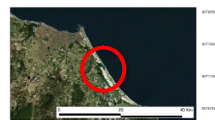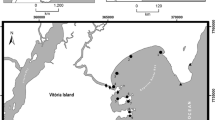Abstract
Specimens of the prosobranch Littorina littorea (L., 1758) collected along the East Frisian North Sea coast in summer 1993 exhibited alterations of the pallial oviduct termed as intersex in response to tributyltin (TBT) pollution. The range of TBT body burden was between 150.9 and 1289.5 µg as Sn kg−1 (dry wt.). Five stages of intersex development (0–4) could be distinguished and are documented with scanning electron micrographs. In stages 2–4, which can be found in the direct vicinity of harbours and marinas, the morphological malformations of the oviduct inhibit successful copulation and capsule formation, resulting in sterilization.
The intersex index (ISI, calculated as the average intersex stage of a population) and the average prostate length of females were used as parameters for the determination of intersex intensities in the populations. Both indices show significant and positive correlations to the TBT body burden of L. littorea and are promising parameters for TBT biomonitoring. A comparison of TBT bioconcentration factors with populations from England and France indicates that the threshold concentration for intersex development is in the range of 15 ng TBT as Sn/l.
Morphometric analyses of the midgut gland revealed no significant differences between sampling stations. In the ovary a retardation and blockage of maturation (atresia) was observed in populations close to harbours. Lytic processes in ovary follicles were observed not only at TBT exposed sites but also at reference stations.
Similar content being viewed by others
References
Bayne, B. L., D. A. Brown, K. Burns, D. R. Dixon, A. Ivanovitci, D. R. Livingstone, D. M. Lowe, M. N. Moore, A. R. D. Stebbing & J. Widdows, 1984. The effects of stress and pollution on marine animals. Praeger, New York, 385 pp.
Bright, D. A. & D. V. Ellis, 1990. A comparative survey of imposex in northeast Pacific neogastropods (Prosobranchia) related to tributyltin contamination, and a choice of a suitable bioindicator. Can. J. Zool. 68: 1915–1924.
Bryan, G. B. & P. Gibbs, 1991. Impact of low concentrations of tributyltin (TBT) on marine organisms: a review. In M. C. Newman & A. W. McIntosh (eds), Metal ecotoxicology: concepts and applications. Lewis Publisher, Ann Arbor: 323–361.
Couch, J. A., 1985. Prospective study of infectious and noninfectious diseases in oysters and fishes in three Gulf of Mexico estuaries. Dis. Aquat. Org. 1: 59–82.
Fioroni, P., U. Deutsch, E. Stroben & J. Oehlmann, 1992. Artificially induced pseudohermaphroditism in prosobranchs and its absence in littorinids. In J. Grahame, P. J. Mill & D. Reid (eds), Proceedings of the 3rd International Symposium on Littorinid Biology. The Malacological Society of London, London: 313–315.
Fioroni, P., J. Oehlmann & E. Stroben, 1991. The pseudohermaphroditism of prosobranchs; morphological aspects. Zool. Anz. 226: 1–26.
Fretter, V., 1980. Gross anatomy of the female genital duct of British, UK Littorina spp. J. moll. Stud. 46: 148–153.
Fretter, V. & A. Graham, 1962. British prosobranch molluscs. Their functional anatomy and ecology. Ray Society, London, 755 pp.
Fretter, V. & A. Graham, 1980. The prosobranch molluscs of Britain and Denmark. Part 5 — Marine Littorinacea. J. moll. Stud., Suppl. 7: 243–284.
Gibbs, P. E., G. W. Bryan, P. L. Pascoe & G. R. Burt, 1987. The use of the dog-whelk, Nucella lapillus, as an indicator of tributyltin (TBT) contamination. J. mar. biol. Ass. U.K. 67: 507–523.
Gibbs, P. E., G. W. Bryan, P. L. Pascoe & G. R. Burt, 1990. Reproductive abnormalities in female Ocenebra erinacea (Gastropoda) resulting from tributyltin-induced imposex. J. mar. biol. Ass. U.K. 70: 639–656.
Gibbs, P. E., B. E. Spencer & P. L. Pascoe, 1991. The American oyster drill, Urosalpinx cinerea (Gastropoda): evidence of decline in an imposex-affected population (R. Blackwater, Essex). J. mar. biol. Ass. U.K. 71: 827–838.
Graham, A., 1988. Molluscs: prosobranch and pyramidellid gastropods. Academic Press, London, New York, 112 pp.
Harding, M. J. C., S. K. Bailey & I. M. Davies, 1992. TBT imposex survey of the North Sea. Annex 4: Germany. UK Department of the Environment, Contract PECD 7/8/214. 20 pp.
Heller, J., 1990. Longevity in molluscs. Malacologia 31: 259–295.
Kalbfus, W., A. Zellner, S. Frey & E. Stanner, 1991. Gewässergefährdung durch organozinnhaltige Antifouling-Anstriche. Final report R + D project UBA, Berlin, 169 pp.
Koopmann, C., J. Faller, K.-H. van Berem, A. Prange & A. Müller, 1993. Schadstoffkartierung in Sedimenten des deutschen Wattenmeeres Juni 1989–Juni 1992. Final report R + D project UBA, Berlin, 156 pp.
Langston, W. J., G. W. Bryan, G. R. Burt & P. E. Gibbs, 1990. Assessing the impact of tin and TBT in estuaries and coastal regions. Functional Ecology 4: 433–443.
Langston, W. J., G. R. Burt & Z. Mingjiang, 1987. Tin and organotin in water, sediments, and benthic organisms from Poole Harbour. Mar. Pollut. Bull. 18: 634–639.
Langton, R. W., 1975. Synchrony in the digestive diverticula of Mytilus edulis L. J. mar. biol. Ass. U.K. 55: 221–229.
Lauckner, G., 1980. Diseases of Mollusca: Gastropoda. In O. Kinne (ed.), Diseases of marine animals. Wiley & Sons, Chichester: 311–424.
Linke, O., 1933. Morphologie und Physiologie des Genitalapparates der Nordseelittorinen. Wiss. Meeresunters. Abt. Helgoland 19: 1–60.
Matthiessen, P., R. Waldock, J. E. Thain, S. Milton & S. Scorpe-Howe, 1991. Changes in periwinkle (Littorina littorea) population following the ban on TBT-based antifoulings on small boats. Int. Council for Exploration of the Sea. Marine Environmental Quality Committee CM 1991/E: 5.
Muggeridge, P. L., 1979. The reproductive biology of the mangrove littorinids Bembicium auratum (QUOY & GAIMARD) and Littorina scabra scabra (LINNE) (Gastropoda, Prosobranchiata), with observations in the reproductive cycles of rocky shore littorinids of New South Wales. PhD Thesis, University of Sydney.
Myint, U. M. & P. A. Tyler, 1982. Effects of temperature, nutritive and metal stressors on the reproductive biology of Mytilus edulis. Mar. Biol. 67: 209–223.
Nordsieck, F., 1968. Die europäischen Meeres-Gehäuschnecken (Prosobranchia). Vom Eismeer bis Kapverden und Mittelmeer. Fischer, Stuttgart, 273 pp.
Oehlmann, J., E. Stroben & P. Fioroni, 1991. The morphological expression of imposex in Nucella lapillus (LINNAEUS) (Gastropoda: Muricidae): J. moll. Stud. 57: 375–390.
Oehlmann, J., E. Stroben & P. Fioroni, 1992. The rough tingle Ocenebra erinacea (Gastropoda: Muricidae): an exhibitor of imposex in comparison to Nucella lapillus. Helgoländer Meeresunters. 46: 311–328.
Oehlmann, J., E. Stroben & P. Fioroni, 1993. Fréquence et degré d'expression du pseudohermaphrodisme chez quelques Prosobranches Sténoglosses des côtes Françaises (surtout de la baie de Morlaix et de la Manche). 2. Situation jusqu'au printemps de 1992. Cah. Biol. mar. 34: 343–362.
Reid, D. G., 1986a. The littorinid molluscs of mangrove forests in the Indo-Pacific region. The genus Littoraria. British Museum (Natural History), London, 227 pp.
Reid, D. G., 1986b. Mainwaringia NEVILL, 1885, a littorinid genus from Asiatic mangrove forests and a case of protandrous hermaphroditism. J. moll. Stud. 52: 225–242.
Reid, D. G., 1989. The comparative morphology, phylogeny and evolution of the gastropod family Littorinidae. Phil. Trans. r. Soc., Lond. B. 324: 1–110.
Romeis, B., 1989. Mikroskopische Technik. Urban & Schwarzenberg, München, Wien, Baltimore, 697 pp.
Short, J. W., S. D. Rice, C. C. Brodersen & W. B. Stickle, 1989. Occurrence of tri-n-butyltin-caused imposex in the North Pacific marine snail Nucella lima in Auke Bay, Alaska. Mar. Biol. 102: 291–297.
Sindermann, C., 1985. Notes of a pollution watcher. In F. J. Vemberg, F. P. Thurberg, A. Calabrese & W. Vernberg (eds), Marine Pollution and Physioloy. Recent Advances. University of South Carolina Press, Durham: 11–30.
Smith, B. S., 1971. Sexuality in the American mud snail, Nassarius obsoletus SAY. Proc. malac. Soc. Lond. 39: 377–378.
Smith, B. S., 1980. The estuarine mud snail, Nassarius obsoletus: abnormalities in the reproductive system. J. moll. Stud. 46: 247–256.
Smith, B. S., 1981a. Male characteristics in the female Nassarus obsoletius: variations related to locality, season and year. Veliger 23: 212–216.
Smith, B. S., 1981b. Reproductive anomalies in stenoglossan snails related to pollution from marinas. J. appl. Toxicol. 1: 15–21.
Smith, B. S., 1981c. Male characteristics on female mud snails caused by antifouling bottom paints. J. appl. Toxicol. 1: 22–25.
Smith, B. S., 1981d. Tributyltin compounds induce male characteristics on female mud snails Nassarius obsoletus = Ilyanassa obsoleta. J. appl. Toxicol. 1: 141–144.
Stroben, E., C. Brömmel, J. Oehlmann & P. Fioroni, 1992a. The genital systems of Trivia arctica and Trivia monacha (Prosobranchia: Mesogastropoda) and tributyltin induced imposex. Zool. Beitr. N.F. 34: 349–374.
Stroben, E., J. Oehlmann & P. Fioroni, 1992b. The morphological expression of imposex in Hinia reticulata (Gastropoda: Buccinidae): a potential biological indicator of tributyltin pollution. Mar. Biol. 113: 625–636.
Taylor, J. D. & J. A. Miller, 1989. The morphology of the osphradium in relation to feeding habits in meso- and neogastropods. J. moll. Stud. 55: 227–237.
Thiel, H., M. Kaiser, J. Lade, H. Marencic & D. Lorch, 1992. Vergleichende Untersuchungen über die Eignung von Wattorganismen unterschiedlicher Trophiestufen zum Trendmonitoring ausgewählter Schwermetalle und polychlorierter Biphenyle. UBA, Berlin, 140 pp.
Thompson, R. J., N. A. Ratcliffe & B. L. Bayne, 1974. Effects of starvation on the structure and function in the digestive gland of the mussel (Mytilus edulis). J. mar. biol. Ass. U.K. 54: 699–712.
Thorson, G., 1946. Reproductive and larval development of Danish marine bottom invertebrates. Medd. Komm. og Havundersøg. Kbh. Ser. Plankton 4: 1–523.
Vega, M. M., J. A. Marigomez & E. Angulo, 1989. Quantitative alterations in the structure of the digestive cell of Littorina littorea on exposure to cadmium. Mar. Biol. 103: 547–553.
Ward, G. S, G. C. Cramm, P. R. Parrish, H. Trachmann & A. Slesinger, 1981. Bioaccumulation and chronic toxicity of bis(tributyltin)oxide (TBTO): tests with a saltwater fish. In D. R. Branson & K. L. Dickson (eds), Aquatic toxicity and hazard assessment. Associate Committee on Scientific Criteria for Environmental Quality, Philadelphia: 183–200.
Author information
Authors and Affiliations
Rights and permissions
About this article
Cite this article
Bauer, B., Fioroni, P., Ide, I. et al. TBT effects on the female genital system of Littorina littorea: a possible indicator of tributyltin pollution. Hydrobiologia 309, 15–27 (1995). https://doi.org/10.1007/BF00014468
Issue Date:
DOI: https://doi.org/10.1007/BF00014468




